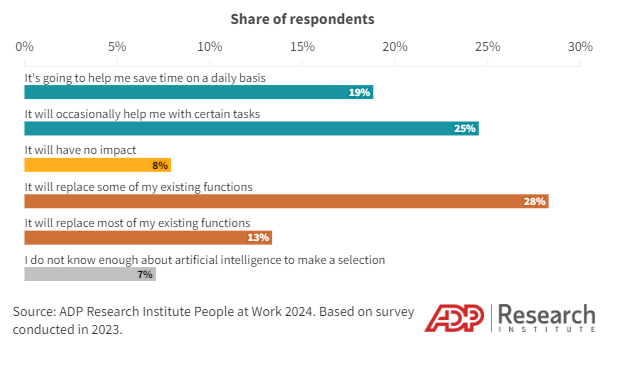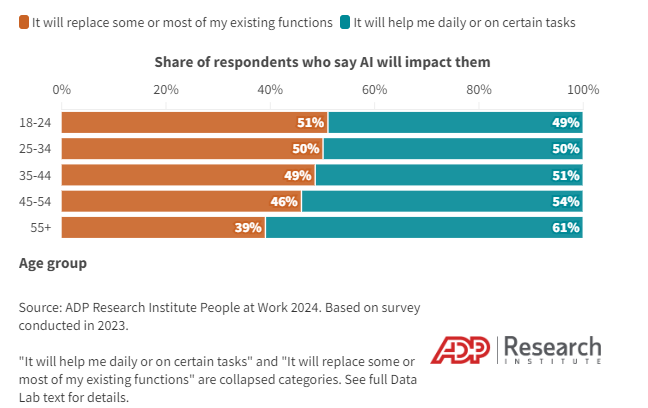ADP: 8 in 10 workers think AI will impact their jobs, and not necessarily for the better
There’s a particular need for HR teams to keep an eye on Gen Z workers – this generation are the leaders of the future, and ADP’s data found that currently this age group are the most concerned about the negative impact of AI!
News In Brief
AI adoption still remains low, but it is growing! Part of the issue is that workers remain unsure about the impact of AI on their work and their jobs.
ADP's 'People At Work 2024' report delved in deeper, and featured insight from the HR tech giant's Chief Economist Nela Richardson.
Here's everything you need to know from the report, including why demographics and geography must stay top of mind as company's adopt AI.
AI is top of every CEO’s priority list.
However, in reality, only a low proportion of companies have fully embraced AI in general, let alone generative AI.
According to the US Census Bureau’s analysis of 1.2 million American businesses, 3.7% of businesses were using AI in September 2023. This rose an impressive 46% and reached 5.4% in February 2024.
The Census Bureau expects that adoption will continue to grow to 6.6% in the next few months and could even reach 12% if the data is employment weighted.
Of course, these statistics may not reflect the true nature of AI use – the Bureau’s report stated: “Firms may use AI in incidentally or insignificant ways, and not report such use, as AI may not be a part of their core processes or products.
“Others may rely on AI embedded in systems or services provided by third parties; in which case they are unknowing users of AI”.
This may explain why other data found more widespread AI adoption – for instance, CompTIA’s 2024 industry outlook found that 22% are actively integrating AI into their business, while 33% are engaging in a more limited implementation.
Either way, AI adoption is not as high as the headlines might claim – a major issue is that the disconnect between employers and employees on AI.
According to data from Slack, while 96% of executives feel the urgency to incorporate AI into their operations, two in three workers have still not actually used AI at work.
What’s the problem? $19 billion revenue HR tech giant ADP decided to survey 35,000 workers in 18 countries to find out their perspectives on AI – will it help or hinder their work and jobs?
Talking about the ‘People at Work 2024’ report’s findings, ADP’s Chief Economist Nela Richardson commented: “For every person who sees AI as an opportunity, another worries about what it might mean for their job.”
Beware of demographics when mitigating worker AI concerns
ADP’s research found that 85% of employees think AI will affect their job in some way – but there’s a split between whether it will help them in their jobs or replace some parts of their work (45% versus 42%).

ADP’s report also found that 7% didn’t know enough to form an opinion on AI at the moment, and 8% thought the technology would have no impact on them at work.
For Richardson, there are a few things that employers – and specifically the HR function – can do to alleviate worker’s ambiguity around AI.
She called on employers to “communicate clear generative AI objectives such as eliminating manual, repetitive, or tedious tasks, and empowering employees to focus their time and effort on more engaging, higher-value work”.
Plus, “employers also should take the time to keep roles and responsibilities up to date as modern technologies are incorporated.
“Offering training and upskilling resources can help ensure employees are informed and well-positioned to leverage the benefits that these technologies could bring to the workplace.”
ADP’s data also delved into how geography and age impacts employees’ views of AI.
Europeans are most worried about AI replacing their job functions – while Latin Americans are most excited about the potential of AI to help them at work.
Younger workers are the most convinced that AI will impact them at work – 21% of the over 55s surveyed said they didn’t know enough about AI to say if it would impact them, compared to 31% of 18 to 24-year-olds.
Also, 20% of over 55s said that AI would have no impact, compared to just 5% of 18 to 24-year-olds.
ADP’s data also found that younger workers were, however, more cautious and worried about AI replacing their work tasks. 51% of 18-24-year-olds think AI will replace some or most of their existing function – but the figure was just 39% for the over 55s.

ADP’s report concluded: “The people who will set a course for the future of the workforce, those Gen Z hires who currently are 27 or younger, have little doubt that artificial intelligence will change their jobs.
“As a group, however, they’re the most likely to disagree on what that impact will be, and whether AI will augment their labor or replace it through automation.
“Gen Z workers, like young workers before them, are adaptable. But as technology develops, they’ll need an assist—training, continuing skill development, and flexible work roles—to keep up with the pace of change.
“Only then will they and their employers be positioned to capitalize on the full benefit of future generations of AI.”
Sign up to the UNLEASH Newsletter
Get the Editor’s picks of the week delivered straight to your inbox!

Chief Reporter
Allie is an award-winning business journalist and can be reached at alexandra@unleash.ai.
